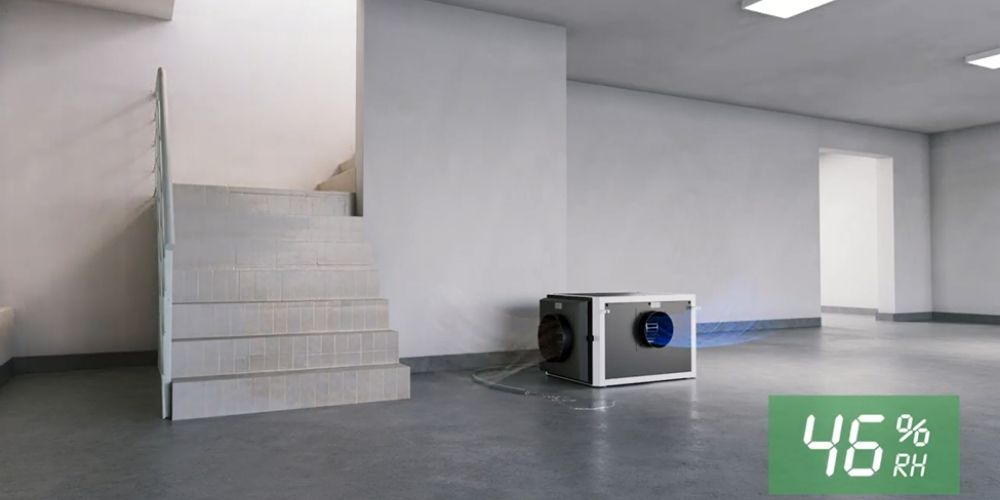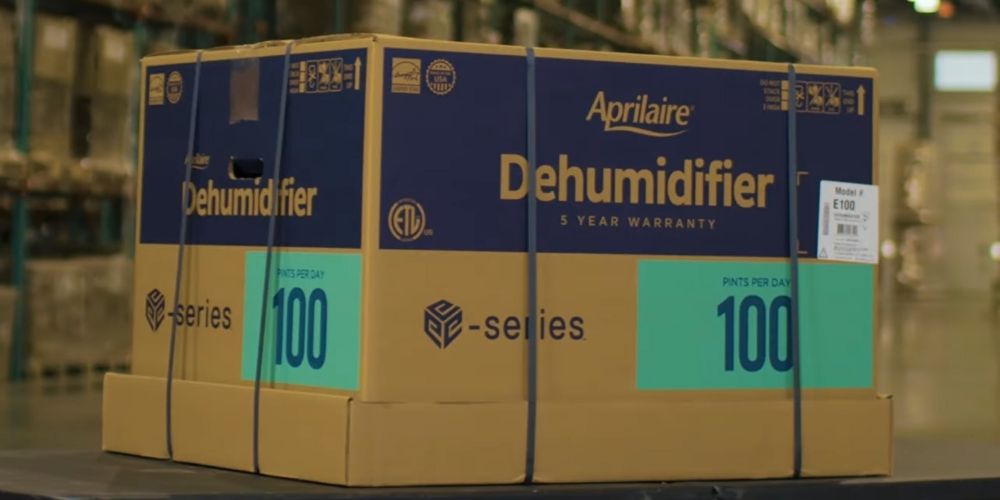Where to buy commercial dehumidifier?
3 Key Takeaways:
🚀 Before investing in a commercial dehumidifier, it’s a good idea to understand the different types of dehumidifiers on the market and assess the cost of purchasing one.
🚀 A commercial dehumidifier is more powerful than a home-use dehumidifier and is perfect for large spaces like warehouses, greenhouses, supermarkets, indoor gyms, basements, etc.
🚀 The blog post provides a helpful guide that answers all your questions about buying an industry-grade dehumidifier.
A dehumidifier can help you combat the negative consequences of humidity by targeting the root cause — moisture. A commercial dehumidifier is a lot more powerful than a home use dehumidifier.
For larger spaces, it can be an effective way to improve the air quality of a space. They are perfect for large spaces like warehouses, greenhouses, supermarkets, indoor gyms, basements, or large buildings and event venues.
There are various companies selling dehumidifiers based on your needs. You could explore sites like Sylvane and Amazon to look at your options before investing in the right industrial dehumidifier for your needs. Our choice of the best industrial dehumidifier that serves the purpose and is easy on the pocket is Alorair 55 pint commercial dehumidifier.
You could also check with your local home improvement stores or water damage specialist for recommendations if you have a specific concern.
Before investing in a commercial dehumidifier, it’s a good idea to understand the different types of dehumidifiers on the market and assess the cost of purchasing one. We have put together a helpful guide that answers all your questions about buying an industry-grade dehumidifier.
What types of dehumidifiers are used on large commercial systems?

Dehumidifiers essentially work to reduce humidity through a cool and hot process. However, with larger commercial devices, the process can vary. Dehumidifiers can be differentiated by their process as well as their size.
In the first case, there are two kinds- the refrigerant/ refrigerator type and the desiccant type.
Refrigerant-based industrial dehumidifiers
This is the most common form of the dehumidifier. In this process, a fan draws in the ambient air and passes it through in-built refrigerant coils that cool the air and remove the humidity. It leads to a drop in temperature and results in condensation droplets, which are then collected in a water tank or pushed out through the drain system. This cool air is then sent back to the room, resulting in a cooler and dryer environment.
Most people prefer this type because it’s ideal for warm and humid weather conditions. It works very well in temperatures above 65°F and humidity levels above 60%. To prevent the coils from freezing because of all the condensation when the temperature drops below 65°F, most dehumidifiers of this type have an auto defrost function to melt any ice that forms.
Desiccant dehumidifiers
The second kind, which tends to be quieter, works through a different process. The desiccant units draw in the ambient air through a desiccant wheel and transfer it to another desiccant wheel to send out. Between the two wheels, the moisture gets trapped, and the warm air is then released back into the environment.
Unlike refrigerants which use compressors, these units rely on chemicals like silica gel to hold the moisture. Since this does not let out cool air, this type is ideal for low temperatures.
Moreover, there is no risk of frost build-up in this process and no need for changing water tanks since no condensation is formed. The warm heaters keep the device from retaining any form of water for too long.
Dehumidifiers can also be differentiated by size–portable, mini, and whole-house units.
- A portable one usually comes with in-built caster wheels and a handle that allows for easy transportation and setup. You can take it wherever you go.
- A mini dehumidifier, ideal for office spaces and dorm rooms, can be carried easily. Given their size, their capabilities may be limited, but they serve the purpose when used in small areas, like crawl spaces or placing them next to your bed.
- Unlike the other two, whole-house dehumidifiers are large and usually mounted to homes’ ceilings or walls so they can be efficient in moisture removal from the whole house.
How long do commercial dehumidifiers last?
Most commercial dehumidifiers can last between 8-10 years, depending on how well they are maintained. The primary purpose of a dehumidifier is to remove excess moisture from environments that are too damp and humid, making it a seasonal problem.
There will be periods when the industrial dehumidifier does not need to run for 24 hours and can be stored away safely. If used correctly and cleaned periodically, the lifespan of a dehumidifier can be extended to a few more years.
However, you may encounter problems that can shorten the unit’s lifespan with heavier usage.
How effective are commercial dehumidifiers?
Commercial dehumidifiers can be very effective in reducing the level of humidity in an indoor space. Usually, because of their large size and functions, they can remove large amounts of moisture daily. This will vary depending on the size, but it typically takes 12-48 hours to achieve optimal air quality. It could take longer– between 2 days to a week for a larger office or commercial space to reach optimal air quality.
Where to buy commercial dehumidifiers? Sylvane Vs. Amazon

Today, there are various companies selling industrial dehumidifiers based on your needs. We recommend looking at both Sylvane and Amazon to find a model, make, and price point that best suits your needs. They are both popular with the customers and offer a range of products that gives you a wide choice. Each company offers dehumidifiers with perfect humidity control functions, and help with moisture removal.
Sylvane is an online retailer of air quality solutions and has a variety of dehumidifiers according to size, model, and budget.
They are known for their air treatment systems and offer a 30-day money-back guarantee on their products, making them easy favorites. You can compare different models and reach out to them for more information.
Amazon offers various brands of dehumidifiers with detailed product descriptions and customer reviews. They also have questions and answers from customers that can give you additional information on the unit of your choice.
The final decision is yours to make. But, finding out if there are special offers or discounts can also help you stay within your budget. Therefore, looking at a commercial dehumidifier in more than one store is a good idea.
Things to look for before buying commercial dehumidifier online
Now that you’ve established the need for a commercial dehumidifier, here are a few things to consider before taking the plunge.
The location of the dehumidifier:
Is it for an office space with people? Is it for a warehouse or storage facility? Will noise be a concern? All of these factors will help you decide which make and model of dehumidifier is suitable for your space.
Since each area will have its unique conditions, you will need a model to address your specific concerns. For instance, a basement, compared to a well-ventilated office space, may require a more powerful dehumidifier as basements tend to be damp.
The dimensions of the space and the materials that make up the space:
These are crucial details as they will determine the capacity of your dehumidifier. An area of over 1000 square feet will require a large capacity dehumidifier, especially if the space is filled with objects or goods.
Besides the place’s temperature, the materials in the area will also determine how much humidity will be present in a space.
For instance, wooden structures are more susceptible to water damage and rot than metal surfaces. Similarly, moisture-retaining materials like plastics and tarpaulins also remain damp for more prolonged periods since they prevent water loss and need to be dried in heat.
The desired humidity level for the space:
After taking into account the average air temperature and weather conditions, it is essential to decide what optimum humidity levels for an environment will be. This will help narrow down whether you require a refrigerator or desiccant dehumidifier. Higher temperatures with low humidity levels will need refrigerator models, whereas lower temperatures with a desire for dry but fairly moist air would appreciate desiccant units.
Will it need to be moved around:
Another factor to consider is whether the dehumidifier needs to be moved around or will remain fixed in one place. A portable dehumidifier with wheels, for instance, is usually smaller and best for single rooms. It can be moved around as and when required if the humidity levels are not constantly high.
The drainage factor in the dehumidifier:
The drainage situation is also a crucial factor in choosing the right dehumidifier. This will help you decide whether you want a unit with a hose that can drain into an external storage unit or a tank that fills up and requires changing. The former is usually a convenient and hassle-free experience. But if the place has mild humidity that can be managed with a small portable dehumidifier, then a tank can work just as well.
Your budget:
Lastly, the amount of money you are willing to spend to resolve your humidity issues. There are dehumidifiers for every budget, some with additional features like filters, digital display systems, noiseless fans, etc. Commercial dehumidifiers range anywhere from $199 for small units and go all the way to $2999 for high-quality machines.
Customer Service:
Customer service plays a very important role when buying a dehumidifier online. Make sure they are reachable when you have queries relating to the specific model.
FAQ Section
1. How do you size a commercial dehumidifier?
Once you have measured the size of your room using a tape measure, multiply the length and width to arrive at the square footage. This will help you determine the capacity of the dehumidifier. Most dehumidifiers are measured by their ability to collect and store moisture from the air for 24 hours.
After you have the square footage, observe the current moisture levels in the room. Is it mild to moderately damp? Is it wet with moisture build-up on windows and signs of wall discoloration and/or rot on furniture? Or is it so wet that there is standing water present in the space?
If it is mild to moderately damp then anything between a 30 to 50-pint dehumidifier will suffice and will work for rooms of up to 1500 square feet.
This does not take into account a humid climate, more than two people living in the space, and a washer/dryer unit. In that case, consider a dehumidifier between 50 to 70 pints. You can also consider this capacity if you fall into the wet or very wet category.
The square footage of an area is usually correlated with the pint capacity of the dehumidifier. This pint capacity refers to the moisture level that a dehumidifier can remove within a 24-hour window.
Ideally, a dehumidifier up to 70 pints works well for residential spaces with up to 2000 square feet in very wet conditions like standing water and damp walls. A dehumidifier with a pint capacity higher than 70 is designed for commercial use.
2. Where can you rent a commercial dehumidifier?
There are a host of websites to choose from when it comes to renting a commercial dehumidifier. Alternatively, you can also check with your local home improvement stores or water damage specialist for recommendations and rental options for commercial dehumidifying equipment.
3. What does it cost to rent a commercial dehumidifier?
It is often relatively cheaper to rent a dehumidifier than to purchase it, especially when you are troubleshooting a temporary problem. Renting a dehumidifier is also a good solution if you are renting a commercial space instead of owning it.
A brand new dehumidifier could cost anywhere between $200- $3000, whereas a rental could cost $40-50 per day to rent a large unit.
4. How much does it cost to install a commercial dehumidifier?
This cost usually varies depending on the type of dehumidifier you purchase and the brand. An installation job typically costs between $800-$2000. We recommend checking with the store you purchase your dehumidifier from for more accurate installation costs.
Wrapping Up
We understand that choosing the best commercial dehumidifier for your commercial building is not an easy decision. There are many factors to consider besides the price and functionality of the device.
You also need to consider the external temperatures, understand the target level of humidity required, and accurately measure the space and its capacity to hold people and objects.
Once you are armed with this information, the decision can become much simpler. We hope this buying guide answers all your questions about purchasing a new commercial dehumidifier.

About The Author
Olivia — a self-confessed air quality addict — is a home climate enthusiast, fresh air advocate, and someone with deep personal experience and knowledge about mold extermination. Her work was mentioned in countless notable humidity publications. Previously she was an editor at Mold Remediation.